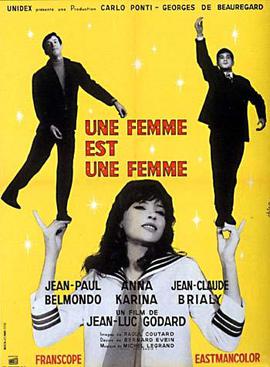 Une femme est une femme (A Woman Is a Woman), 1961
Une femme est une femme (A Woman Is a Woman), 1961Dir: Jean-Luc Godard
May 21, 2009
Netflix Wakefield MA
Knowing that Godard is obsessed with cinema as life, "CINEMA" is boldly projected in the titles, is the first part of understanding practically all of his early output. A Woman Is a Woman is his third feature film, and like Breathless (1960), is filled with references to other films. Godard wants you to know that you are watching a film, and has no interest in trying to disguise that fact. Of course, his penchant for the cinematic is to my taste, but watching the film gets a bit of getting used to.
A Woman Is a Woman is an homage to the American musical comedy of the 1940-50s. While some parts of the film were funny, I think others were lost in translation. At one point, well according to the subtitles anyway, they were talking about how you say things in French and how you pronounce them, which would be completely irrelevant in English obviously. So I'm guessing I missed out on some witty French puns. Oh well. The main plot, if there is one, is centered around Angela (Anna Karina), who is an exotic dancer. She lives with her boyfriend/lover/whatever Emile, and at their place they have witty banter and foolish arguments, all in the name of love. Of course, Angela decides she wants to have a baby (what stripper doesn't, right?) while Emile is not agreeable. As a joke (seemingly), Emile suggest that she ask his best friend Alfred to get her pregnant. Once he comes over, they make a joke about it and Angela gets mad, but we soon find out that Alfred's feeling might be a bit more serious.
Godard is very cheeky in the way he scrutinizes cinema, and in this film he is no different. The disjointed soundtrack, moving back and forth between old 40s songs; the random breaking into song; the winks at the camera. It's all very clever, and Godard knows it. One of the most telling of these moments is when Angela and Emile are having another fight, and they end up on opposites sides of the room. The camera begins to pan slowly back and forth between them, now still, while a narrator makes anecdotes about love while the words he says pop into the screen as the camera moves. I think that Godard knows the ridiculousness of it all, and that's what makes the film decent. In the end he accomplished what he wanted to do, to make a musical comedy while scrutinizing why he loved them in the first place, and why he thought they they were so over the top. Maybe he thought they were just "cinematic."
No comments:
Post a Comment